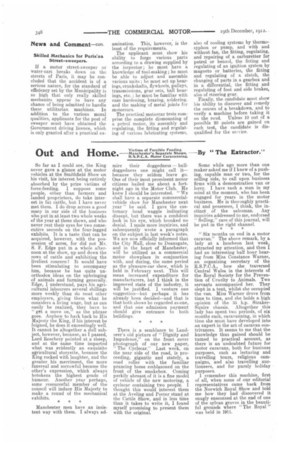Out and Home - Victitns of Forcible Feeding.
Page 12

If you've noticed an error in this article please click here to report it so we can fix it.
R.s.P.c.A. motor caravanning.
Manchester's Separate Shows. -By "The Extractor."
R.s.P.c.A. motor caravanning.
So far as I could see, the King never gave a glance at the motor vehicles at the Smithfield Show on his visit, his interest being entirely absorbed by the prize victims of force-feeding. I suppose some people, other than farmers and landed proprietors, do take interest in fat cattle, but I have never met them. I do drop across a good many in our side of the business who put in at least two whole weeks of the year at these shows, and who never rest their eyes for two consecutive seconds on the four-legged exhibits. It is a taste that can be acquired, however, with the possession of acres, for did not Mr. S. F. Edge put lii a whale afternoon at the show, up and down the rows. a cattle and exhibiting the liveliest concerng It would have been stimulating to accompany him, because he has quite unorthodox ideas on the upbringing of animals and farming generally. Edge, I understand, pays his agricultural labourers several shillings more weekly than do meet other employers, giving them what he considers a hying wage, but as can easily be realized, they have to " get a move on," as the phrase goes. Anyhow to hark back to His Majesty the King, if his interest be feigned, he does it exceedingly well_ It cannot be altogether a dull subject, however, because, as I passed, Lord Rosehery pointed at a sheen, and at the same time imparted what was evidently an exquisite agricultural storyette, because the King rocked with laughter, and the greater his merriment, the more funereal and sorrowful became the other's expression, which always betokens the highest grade of humour. Another year perhaps, some resourceful member of the council will induce His Majesty to make a round of the mechanical
exhibits.
Manchester men have an insistent way with them. I always ad mire their doggedness — bulldoggedness one might call it— because they seldom leave go. One of their most prominent motor citizens hailed me about a fortnight ago in the Motor Club. He knew I should be interested. "We shall have a separate commercialvehicle show for Manchester next year" he said. I gave the cuetomary head waggle indicating dissent, but there was a confident look in his eye, which brooked no denial. I made more inquiries, and subsequently wrote a paragraph on the subject in last week's notes. We are now officially informed that the City Hall, close to Deansgate, and in the heart of Manchester, will be utilized as a commercial motor showplace in conjunction with, and during, the same period as the pleasure-car show, which is held in February next. This will mean increased expenditure for manufacturers, but I think in the improved state of the industry, it will be justified. I venture one suggestion—but perhaps it has already been decided—and that is that both shows be regarded as one, and that one admission payment should give entrance to both buildings.
There is a semblance to Landseer's old picture of "Dignity and Impudence," on the front cover photograph of our new paper, " The Cyclecar." Last week, on the near side of the road, is proceeding, gigantic and stately, a road roller with the familiar prancing horse emblazoned on the front of the smokehox. Coming perkily abreast of it is a fine model of vehicle of the new motoring, a cyclecar containing two people. I thought this would interest them at the Aveling and Porter etand at the Cattle Show, and in less time than it takes to write it, I found myself promising to present them with the original. Some while ago more than one maker asked me if I knew of a pushing, capable man or two, for the selling side, to call upon business firms with a demonstration van or lorry. I have such a man in my mind at the moment, who has been engaged for years in the motor business. He is thoroughly practical and possesses, I think, the instinct of the salesman. Any inquiries addressed to me, endorsed " Selling," care of this journal, will be put in the right channel.
"Six months on end in a motor caravan." The above remark, by a lady at a luncheon last week, attracted my attention, and then I had an interesting half hour hearing from Miss Constance Warner, an organizing secretary of the R.S.P.C.A., how she traversed Central Wales in the interests of the Royal Society for the Prevention of Cruelty to Animals. Two servants accompanied her. They slept in a tent, whilst she occupied the van. Miss Warner drove from time to time, and she holds a high opinion of the 35 h.p. StrakerSquire chassis. Altogether this lady has spent two periods, of six months each, caravanning, in which time she must have developed into an expert in the art of caravan contrivances. It seems to me that the knowledge thus gained should be turned to practical account, as there is an undoubted future for motor caravans, both for business purposes, such as lecturing and travelling tours, religious campaigns, and also travelling auctioneers, and for purely holiday purposes.
I remember this machine, first of all, when some of our editorial representatives came back from the Norwich Royal Show and told me how they had discovered it snugly ensconsed at the end of one of the sylvan groves in the beautiful grounds where " The Royal " was held in 1911.




















